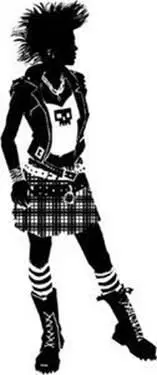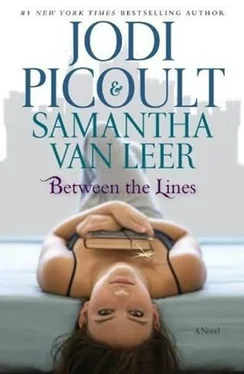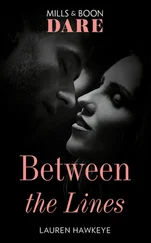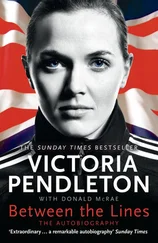Jules and I are not popular. In fact, I am pretty much banned from ever being popular or, for that matter, within a hundred feet of anyone popular. Last year when we were playing softball in gym, I swung the bat and broke the left knee of Allie McAndrews, the head cheerleader. Allie had to stay off the top of the pyramid for six weeks and accepted her prom queen crown on crutches.

The worst part was I completely missed the ball. Anyone who didn’t hate me before the Injury suddenly had a reason to ignore me or sneer at me or slam me against a locker when we passed in the halls. Except Jules, who moved here a week after it happened. When I told her why I was a social pariah, she laughed. “Too bad you didn’t break them both,” she said.
Jules and I have no secrets. I know that she is addicted to soap operas, and she knows that my mother is a cleaning lady. There’s only one thing I haven’t told Jules, and that’s the fact that for the past week, the reason I’ve avoided her is that I’m embarrassed by my choice of reading material.
A fairy tale written for elementary school kids.
If you think it’s social suicide to literally bring the head cheerleader to her knees, you should try reading a children’s book in plain sight in a high school. If you read Dostoyevsky, you’re weird but smart. If you read comic books, you’re weird but hip. If you read a fairy tale, you’re just a dork.
I discovered this story a month ago, when I was eating lunch quietly in the school library. There I sat, chewing on a peanut butter and Fluff sandwich, when I noticed that one book on the shelf was upside down and backwards, as if it had been jammed in. Figuring I could help Ms. Winx, the librarian, I went to fix it, and got an enormous electric shock to the tips of my fingers.
The book was tattered and the spine was shaky-I would have thought that by now it would have made its way to the annual sale, where you could buy old novels for a dime each. It was illustrated-clearly a fairy tale-but it was shelved with nonfiction books about World War I. And strangest of all, it didn’t have a bar code to be checked out.
“Ms. Winx,” I asked, “have you ever read this one?”
“Oh, a long time ago,” she told me. “But it’s actually quite special. The author hand-painted the pictures and had it bound.”
“It must be worth a fortune!”
“Not so much,” Ms. Winx said. “The writer was known for her murder mysteries. This was more of an experiment for her. A prototype that never evolved. In fact, she never wrote another book after this one. I was a big fan of her other novels, and couldn’t pass this up when I found it at a rummage sale. So for a nickel, it became the property of the school.”
I looked down at the cover- Between the Lines, by Jessamyn Jacobs.
I checked it out that first day, and while I was in Earth Science class, I hid the fairy tale inside my textbook and read it from cover to cover. It’s about a prince, Oliver, who goes on a quest to rescue a princess, who’s been taken hostage by the evil Rapscullio. The problem is that Oliver, unlike most fairy-tale princes, isn’t a big fan of taking risks. His father died in battle, and as far as he’s concerned, it’s far better to be safe than sorry.
I think that’s what made me keep reading. The very first thing you learn about Oliver is that it wasn’t easy growing up without a dad. It was as if the words had been taken straight from my mouth. My father had not died in battle, but he’d left my mother when I was ten years old and found himself a new, improved family. She cried every night that year. I was a straight-A student-not because I loved school but because I didn’t want to be one more person who disappointed my mother. We had to move to a small house and my mom had to work hard cleaning the homes of the girls who treated me like pond scum.
True confessions time: Oliver is cuter than any guy in my school. Granted, he is two-dimensional and illustrated. Don’t judge me-go take a look at Wolverine in an X-Men comic and tell me he isn’t hot. With his jet-black hair and pale eyes, it seems that Oliver is smiling up from the page directly at me. Clearly, any normal girl would take this as a sign that she needs to get out more. But me, I don’t have too many places to get to.
Plus, he is smart. He conquers one obstacle after another-not with his sword but with his cleverness. For example, when he is held captive by a trio of creepy, boy-crazy mermaids, he promises to get them dates in return for a pack of supplies-flotsam and jetsam that had washed into the ocean after shipwrecks. He uses that junk-other people’s garbage-to rescue himself from the snares of the fiery dragon that had killed his own father. He’s not your typical prince, more like a square peg in a round hole, kind of like me. He’s the sort of guy who wouldn’t mind reading side by side on a date. And he knows how to kiss, unlike Leonard Uberhardt, who practically tried to swallow me whole behind the jungle gym in seventh grade.
That first week, I read the book so often that I memorized the words; I knew the layout of the pictures on the pages. I dreamed that I was being chased by Rapscullio or forced by Captain Crabbe to walk the plank. Each week, I’d bring the book back to the library, because that was school policy. I’d have to wait until it was returned to the shelf a day later, giving someone else a chance to read it. But what other ninth grader cares about fairy tales? The book was always waiting for me, so I could check it out again and reconfirm my position as Public Loser Number One.
My mother worried. Why was a girl like me, who could easily read thousand-page adult novels, obsessed with a children’s book?
I knew the answer to that, not that I was about to admit it to anyone.
Prince Oliver understood me better than anyone in the world.
True, I’d never met him. And true, he was a fictional character. But he also was what people needed him to be: a dashing hero, an articulate peacemaker, a cunning escape artist. Then again, Prince Oliver had never existed anywhere but on a page, and in some random author’s brain. He didn’t know what it was like to be stuffed into a locker by the cheerleading squad and left there until some janitor heard me yelling.
Today, I decide as I wake up and stare at the ceiling, is going to be different. First thing, I am going to return the book to the library. In my English journal, I’ll write down that I’ve been reading The Hunger Games for my outside reading requirement (like 98 percent of the ninth grade), and I’ll explain why I am Team Peeta instead of Team Gale. I’ll tell Jules that we should go to the Rocky Horror marathon at the cheap theater this weekend. Then in Earth Science I’ll finally get enough courage to go talk to Zach, my vegan lab partner who insists on feeding tofu crumbles to the class Venus flytrap, and who probably will save the whales before he turns twenty-one.

Yes, today is the day everything is going to change.
I get up and take a shower and get dressed, but the fairy tale is sitting on my nightstand where I left it before I went to bed. This must be what an addict feels like, I think, trying to fight the pull of one last, quick read. My fingers itch toward the binding, and finally, with a sigh of regret, I just grab the book and open it, hungrily reading the story. But this time, something feels wrong. It is like an itch between my eyebrows, a wrinkle in my mind. Frowning, I scan through the dialogue, which is all the way it should be. I glance at the illustration: the prince sitting on a throne, his dog waiting beside him.
Читать дальше














